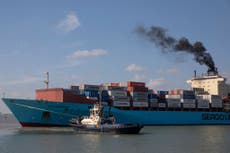Brexit: Port chiefs warn £200m for upgrades is nowhere near enough and time running out to start work
Infrastructure work has taken nearly a year in the past, but just six months will be available – even if the cash is there

The bill for easing post-Brexit turmoil at UK ports will be far more than the £200m available and time is running out to start the work, an inquiry has heard.
Port chiefs said infrastructure work had taken nearly a year in the past – but they would have just six months and only because full import controls have been delayed until next June.
Tim Morris, head of UK Major Ports Group, told a Lords committee that no funding decisions had yet been taken, so operators were unable to “start laying concrete, putting space in the ground”.
Mr Morris warned: “We already know that element of the finance is already significantly oversubscribed, so more ports have put in bids for a higher financial amount than the facility is.”
And, on the June deadline, he added: “We are going to have to move more quickly, significantly more quickly, than we have before.”
It is understood the government has refused requests to say by much the £200m fund will fall short, after receiving 53 bids, or whether more cash will be made available – ahead of decisions on applications early next month.
Costs are expected to soar because of the rush, forcing work to take place at weekends or over holiday periods, and because suppliers will be able to charge more.
The £200m is only a slice of the £705m set aside for new border controls, needed because frictionless trade will be lost when the UK leaves the EU single market and customs union.
Although that will happen when the transition period ends on 31 December – threatening huge queues for lorries trying to cross the Channel – controls on imports will not start until June.
The British Ports Association highlighted confusion over the extent of checks on animal and plant products – warning they could “completely kill” imports of cut flowers from Holland to the Humber, for example.
The head of the Port of Rotterdam told the Lords EU goods sub-committee: “That is indeed the sector we are worried about the most.
He warned of “lot of forms and formalities to comply with, which makes it difficult for them to make the business case right”.
Peter Lilley, the former Conservative cabinet minister, said it was “just breathtaking” the Rotterdam and Calais ports appeared to be far better prepared than those in the UK.
“We have had to wait for some of the instructions from our government,” pointed out Richard Ballantyne, chief executive at the British Ports Association.
The concerns come after hauliers also warned of looming chaos, because a guide to navigating the mountain of new red tape involved in transporting goods was still not available.
Logistics UK, which represents freights group, warned of “lorry queues at Dover and empty shelves in Northern Ireland”, when the transition period ends in just 45 days’ time.
Join our commenting forum
Join thought-provoking conversations, follow other Independent readers and see their replies
Comments




Bookmark popover
Removed from bookmarks